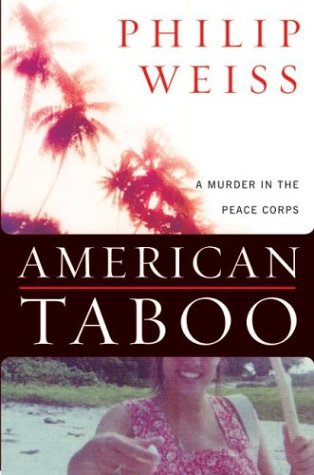Archive copy of original story
Peace Corps Online:
Directory:
Tonga:
Special Report: 'American Taboo: A Murder in the Peace Corps':
May 31, 2004: Headlines: COS - Tonga: Crime: Murder: Safety and Security of Volunteers: The News Tribune: Violent death, no justice for Peace Corps volunteer :
Archive copy of original story
American Taboo: A Murder in the Peace Corps
 | American Taboo: A Peace Corps Tragedy
Returned Volunteers met with author Philip Weiss in Baltimore on June 18 to discuss the murder of Peace Corps Volunteer Deborah Gardner. Weiss was a member of a panel that included three psychiatrists and a criminal attorney. Meanwhile, the Seattle U.S. Attorney's office announced that Dennis Priven cannot be retried for the murder. "We do not believe this case can be prosecuted by anyone, not only us, but in any other jurisdiction in the United States." Read background on the case here. |
 | Charges possible in 1976 PCV slaying
Congressman Norm Dicks has asked the U.S. attorney in Seattle to consider pursuing charges against Dennis Priven, the man accused of killing Peace Corps Volunteer Deborah Gardner on the South Pacific island of Tonga 28 years ago. Background on this story here and here. |
 | American Taboo
Read the story of Volunteer Deborah Gardner's murder in Tonga in 1976 and how her killer has been free for the past 28 years with the help of the Peace Corps. Read an excerpt from Philip Weiss' book documenting the murder and coverup. Then read an essay by RPCV Bob Shaconis who says that Peace Corps' treatment as a "sacred cow" has exempted it from public scrutiny and that the agency has labored to preserve its shining reputation, sometimes at the expense of the very principles it is supposed to embody. |
Violent death, no justice for Peace Corps volunteer

Violent death, no justice for Peace Corps volunteer
Violent death, no justice for Peace Corps volunteer
LES BLUMENTHAL; The News Tribune
WASHINGTON - Deborah Gardner was considered by some to be the prettiest woman in the Peace Corps - a free spirit with a quiet side whose sense of adventure and idealism led her from the South Sound to a high school in the South Pacific where she taught biology and home economics.
But in the fall of 1976, the 23-year-old Lakes High School graduate from Lakewood was stabbed to death on the island kingdom of Tonga.
Nearly 28 years later, the case has resurfaced in a book that provides new details about her slaying and its aftermath, including the broken promise that allowed Gardner's alleged killer, another Peace Corps volunteer, to remain free and lead a seemingly normal life.
Philip Weiss, author of the book "American Taboo," said the actions of the Peace Corps in the days, weeks and months after Gardner's slaying were "indefensible" and amounted to nothing less than a cover-up.
Advance copies of the book already have spurred interest on Capitol Hill. One Tacoma-area congressman, Rep. Norm Dicks (D-Belfair), said he will ask the Peace Corps and the State Department to review their files to assure that actions taken by the agencies at the time were proper.
As for Gardner's parents, the book has brought back unpleasant memories.
"I can only read a few pages at a time," said Gardner's mother, Alice, who still lives in the Tacoma area. "It's hard for me to read. I have to stop. I think of her all the time."
After all these years, Gardner's father, Wayne, still wants justice. "I would tie the hangman's knot," Gardner said from his home in northern Idaho. "I would help him up the steps of the scaffold."
Though Weiss first heard of the murder in 1978 from a Peace Corps worker he met while backpacking in Samoa, he didn't start his research until nearly 20 years later.
The story Weiss tells, based on hundreds of interviews and a protracted search of records held by the Peace Corps, the State Department and the National Archives, is a chilling account of a crime Weiss believes still begs for a federal investigation.
Not guilty by reason of insanity
The man accused of stabbing her 22 times, Dennis Priven, was reputedly the best poker player on the main island, yet a loner who had become obsessed with Gardner, according to the book. Peace Corps officials in Tonga were warned about Priven's growing fixation with Gardner. Nothing was done.
In the weeks before her murder, Deborah Gardner had grown increasingly anxious because of Priven, then 24, and attention from other male colleagues. She asked local Peace Corps officials to transfer her to one of Tonga's outer islands, according to Weiss' account. The transfer was denied because it was considered too remote for a single woman.
Within hours of Gardner's death, Priven turned himself in, though he didn't confess. Charged with murder, Priven could have been hanged if convicted.

U.S. law requires that the Peace Corps hire a lawyer to defend one of its workers charged with a crime. In this case, the agency hired Tonga's best lawyer and flew in a psychiatrist from Hawaii to evaluate Priven. Almost immediately, Peace Corps officials, both in Tonga and in Washington, D.C., focused their attention on saving Priven and protecting the agency's reputation, according to Weiss' book. "They did so to preserve their own careers, to preserve the American presence in the South Pacific and to preserve the churchly image of the Peace Corps," Weiss wrote.
After a nine-day trial, a jury took 26 minutes to find Priven not guilty by reason of insanity at the time of the slaying. The Hawaiian psychiatrist testified that Priven suffered from latent paranoid schizophrenia.
The Tonga prosecutors didn't have the money to hire their own psychiatric expert.
After the verdict, the judge in the case said Priven was a "volcano" who required "long-term if not permanent" incarceration, the book said. But Tonga didn't have a mental hospital, and authorities didn't know what to do with him.
In the end, Priven was released to Peace Corps officials after a written assurance from a top U.S. embassy official that he would be committed, either voluntarily or involuntarily, to a mental hospital in the United States, according to the book.
He wasn't.
Free after two days in hospital
After two days in Sibley Hospital in Washington, D.C., Priven was allowed to check out after a psychiatrist said he could find no evidence of schizophrenia, according to the book.
He received a routine discharge from the Peace Corps and settled in his parents' apartment in Brooklyn, N.Y., where, Weiss said, Priven apparently still lives. Priven worked for the Social Security Administration before retiring from his $78,000-a-year job last year, Weiss said. He turned 52 last Friday.
Until contacted by Weiss several years ago, the Gardners, who are divorced, believed Priven had been committed to a hospital. They had no idea he was free.
"I still haven't heard from the Peace Corps," said Wayne Gardner. "I don't tolerate liars. I detest them. But that's what the Peace Corps did. It was one big lie."
Gardner said he first learned of his daughter's death while moose hunting in Alaska, where he was living at the time. Alice Gardner said she was notified while at work in a Bon Marche department store in Tacoma.
But not until Nov. 2, 19 days after Deborah Gardner's death, would the Peace Corps issue a brief press release saying one of its volunteers had been killed in Tonga and another had been charged with murder, according to Weiss' book. The announcement went largely unnoticed. The papers were filled with stories about Jimmy Carter's election victory over President Ford.

As news of Gardner's slaying spread at the Peace Corps headquarters in Washington, D.C., the agency's lead counsel said in a memo that all "outside communications" about the case, particularly to the families, needed to be "carefully controlled," though it didn't specify why, according to Weiss' account. Weiss wrote that U.S. officials manipulated the Tongan justice system during the trial, lied to the Tongan government to secure Priven's release and misled Gardner's parents.
"They had covered up the case," Weiss said.
In fall 2002, Weiss decided to confront Priven.
No public remorse
Weiss said the meeting was "civilized" and described Priven as a "deeply alienated, brilliant person. But he was cold, very cold."
In the end, Weiss said Priven didn't admit anything.
"He has never expressed remorse in any public way," Weiss said. "Does he feel it? I don't know."
Weiss said he has not heard from Priven since they talked. His book, published by HarperCollins, will be released Tuesday.
Efforts by The News Tribune to reach Priven were unsuccessful. The telephone company had a phone number for Priven but wouldn't release it, at the customer's request. The phone number Weiss has for Priven is connected to a fax machine. After a request for an interview was faxed, a woman called back to say there was no Dennis Priven at that number.
Both the Peace Corps and the State Department had no comment on Weiss' book.
"Unfortunately, because the case is 28 years old, we don't know anything," said Barbara Daly, a Peace Corps spokeswoman.
Daly said the Peace Corps could not release information about Priven without his authorization. In addition, Daly said that when a Peace Corps volunteer in a foreign country is charged with criminal activity, the case is immediately turned over to the State Department or the Justice Department.
Ken Bailes, a State Department spokesman, said any records on the Gardner case would have been sent to storage long ago.
"I know zero about this," he said.
Doing something meaningful
Alice Gardner says that after all the years, she has finally come to terms with her daughter's death.
"She was beautiful, with gorgeous expressive eyes that sparkled," said Alice, who has remarried and asked that her current last name not be used.
While attending Lakes High School, Alice said, her daughter volunteered in the geriatrics and emergency room at Tacoma General Hospital. During the summer when she attended Washington State University, she worked at The Ram, a tavern in the Tacoma area, and as a car hop at a local drive-in.
"I wasn't shocked when she entered the Peace Corps," Alice said, with a long pause as she checked her emotions. "She wanted to do something meaningful."

Since Weiss first contacted her three years ago, Alice Gardner has known that the story of her daughter's death was going to be told. She, too, would like to see justice done, but realizes it's unlikely. "I don't think there is anything anyone can do," she said.
Les Blumenthal: 202-383-0008
lblumenthal@mcclatchydc.com

Some postings on Peace Corps Online are provided to the individual members of this group without permission of the copyright owner for the non-profit purposes of criticism, comment, education, scholarship, and research under the "Fair Use" provisions of U.S. Government copyright laws and they may not be distributed further without permission of the copyright owner. Peace Corps Online does not vouch for the accuracy of the content of the postings, which is the sole responsibility of the copyright holder.
Story Source: The News Tribune
This story has been posted in the following forums: : Headlines; COS - Tonga; Crime; Murder; Safety and Security of Volunteers
PCOL11703
63
.




